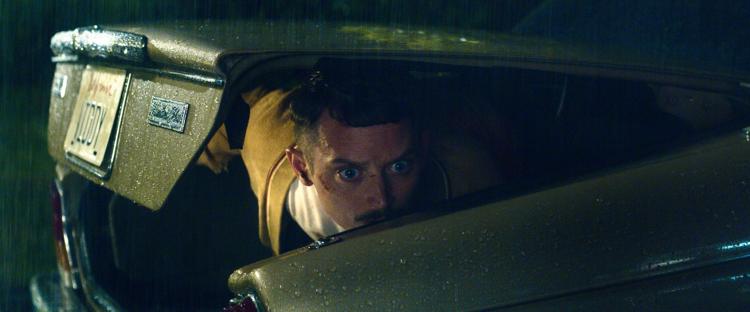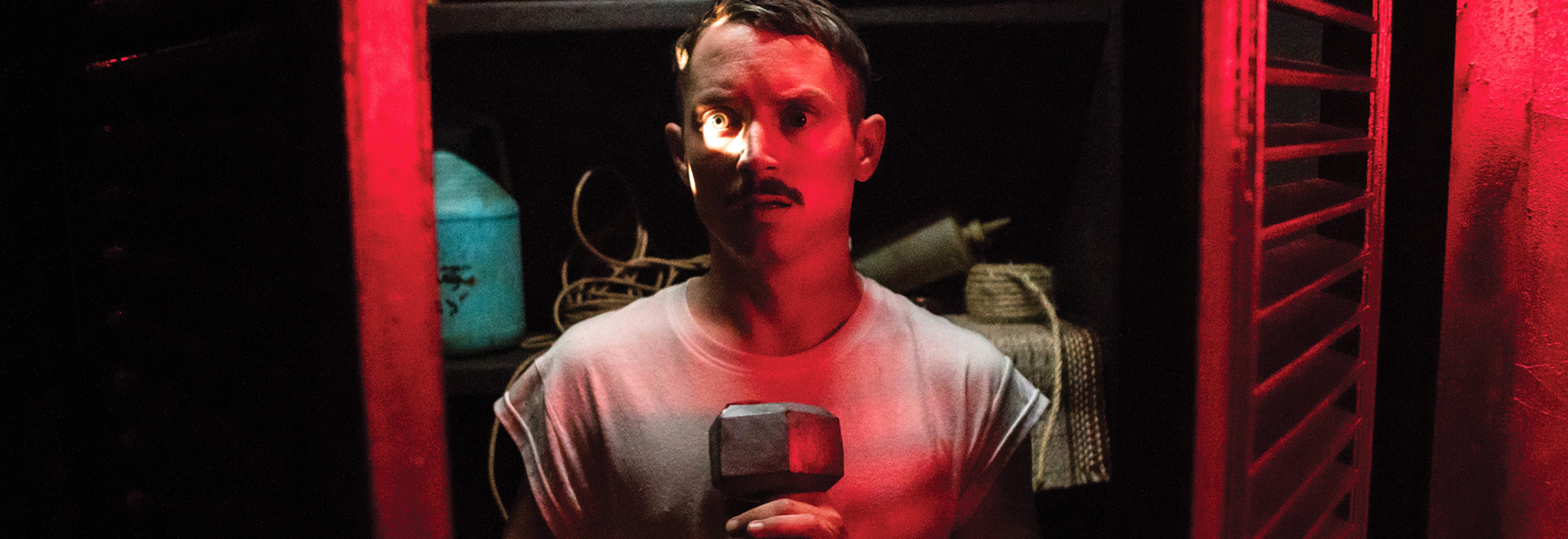I’ve found myself falling in love with a wildly different sort of a movie. These are Independent films still, but they are riddled with crazy levels of violence. The violence though is crafted in the support of the movie’s larger raison d’être. I’m thinking of films like Green Room, Blue Ruin, Us and Them, Bad Times at the El Royale, Killing of a Sacred Deer, etc., etc. Think of these films as Greek Tragedies, or Greek Morality plays, but instead of being forbidden to show the violence on stage, American Tragedies, or American Morality plays revel in the violence of the act. It’s almost like we are walking into a new golden age of movies as cultural warning signs maybe? Or maybe screenplay authors are crafting brilliant excuses for excessive violence wrapped up, and shrouded in, the idea of myth? Regardless, I’m really digging this new renaissance of Indie film-making vision. So today, we will be explaining Come to Daddy and that crazy ending.
Toby Harvard, the author of the screenplay, has stated more than once that the impetus for the movie came when he was forced to spend several days with his recently deceased father. So, going into it, I just assumed that the movie would actually be an introspective affair. An internal study of loss, and lost opportunities. A cavalcade of well wishers and mourners all intent on sharing a part of his father that he hadn’t realized or understood. An opening of vistas. A broadening of horizons.
No. That is not what this movie was to be about.
If you haven’t seen the film, definitely click one of these links right here where you can watch currently online:
That trailer actually does a pretty good job hiding the unravelingly crazy ride that this movie is. Alright, if you haven’t seen it yet, here are locations in which you can watch said unravelingness? Prime, Play, & Vudu.
Quick Come To Daddy Walkthrough
Norval, out of the blue, receives a letter from his father asking Norval to come visit him. Seeing as though Norval’s father abandoned him and his mother when he was five, this is a pretty significant request. An extraordinarily life changing sort of request. So Norval makes the trek out into the middle of nowhere, through the forest, and to a cabin on the coast of Oregon. But Norval’s happy reunion with Brian (Stephen McHattie), his father, is short-lived when his father begins taunting Norval and belittling him. Eventually the animosity pours over, and Brian physically assaults Norval with a meat cleaver. And somewhere in the middle of the struggle, Brian has a massive heart attack and dies.
Norval is obviously upset, and calls his mother, who promises to come in the next several days. In the meantime, the coroner takes the body, embalms it, and due to a lack of space at the morgue, returns it to Brian at the house. Norval has a terrible time sleeping because of the body in the house, and also because of loud noises occasionally reverberating throughout the house. Finding photos of him, his father, and his mother, Norval realizes that Brian, was not in fact, his father at all. And finding passage into an underground basement location in the house, discovers his real father chained up and bloodied in the basement. Simultaneously, Jethro arrives to torture Norval’s father again, and Brian let’s Norval know it’s up to him to kill this man or they are both dead. But ultimately Jethro escapes while promising to come back for them.
Two dislocated fingers later, Norval finally frees Brian, his real father. And it is then that Norval learns that when he left him and his mother, he went to Bangkok. And it was there that he and a group of friends, including Jethro, Dandy, and Gordon – the faux dead father – kidnapped the daughter of the richest man in Thailand, and held her until they received a large ransom. It was then that Norval’s father double-crossed his friends, stealing their share of the ransom, and running for it. He’s been on the run ever since. Which is interesting, because it was with this money that Brian funded Norval’s affluent west Hollywood life.
It’s in the middle of Norval’s real reunion with his genuine father, that Dandy arrives. Norval and Dandy fight and it ends in a truly disturbing death for Dandy involving Dandy’s genitals and a barbecue fork. Freed to make a run for it, mid-escape from the house, Jethro returns to hunt the two men down. Deciding that the best way to get revenge is for Norval to climb into the trunk, and to attack Jethro when he least expects it…which, I have to say, is the absolute worst plan I have ever heard of. Realistically, we watched Jethro pull the crossbow from the trunk. Returning to the car, the odds are very high (nigh-on perfect) that he’ll extinguish the flaming crossbow bolt, and put the contraption back in the trunk. Wherein, finding Norval curled up in his trunk, would only have to bury a bolt into the kids throat and have it over. But, the screenplay writer intervened…and Jethro didn’t return the crossbow to the trunk, and instead, drives to a nearby motel where he had arranged to meet a prostitute. Breaking into the room, the prostitute holds Norval in a headlock, while Jethro stabs him multiple times, and shoots him in the face with the crossbow. Jethro attempts to flee in the car, but Norval popped its tires, and Jethro crashes into a sign, which partially slices the top of his skull off.
Sitting in the street, Jethro lets Norval know that his mother was a prostitute that both Brian and Jethro both had slept with. Norval then stabs Jethro in the exposed portion of his brain. And as he died, Jethro exclaims, “Arthur!” Very hurt, but alive, Norval walks back to the house to be reunited with his father. As his father dies there on the beach, Norval apologizes to Brian that he never let his mother get over him. Roll credits.

Understanding that Come to Daddy Ending
This movie is literally a Greek, Oedipal complex, attempt at de-tangling the chaos of fathers and sons amidst the inevitable tragedy of life. Wait, what? I personally think Freud is full of crap. But that doesn’t mean he isn’t occasionally useful. He defined the Oedipal complex as a phase of life that occurs in developing children (the Phallic stage – ages 3 – 5) who experience an unconscious feeling of desire for their opposite-sex parent, and jealousy and envy towards their same-sex parent. More importantly than the Freud influence here, is the influence of Greek Tragedy…which, I’m nearly certain, most of you read about in middle school and high school. You know, the hyper-violent Oedipus Rex? Basically, it is just one big attempt to avoid a prophecy of his killing his father and marrying his mother. Which, he guarantees the outcome by attempting to avoid it. Come on, middle school cluelessness aside, this is brilliant stuff. Sophocles is basically emphasizing the irony of a man determined to track down, expose, and punish an assassin, who turns out to be himself!
But what about that Come to Daddy (If that isn’t the most Oedipal movie title ever, I don’t know what is) ending? Well, the plot of this movie was hatched when Toby Harvard was forced to sit with his father’s corpse over a couple of days. It was his wrangling with his dead father that produced this script. It starts off autobiographically, but then wanders into the land of Greek Tragedy and loss. We all experience this same tragedy in our own relationships with our parents, regardless of how good, or tightly knit we are with them. We become them, even in spite of (actually because of?) our efforts to rebel against everything that they are. This story is the tragic telling of this fate. Of our deterministic ends. You see this in Norval’s face when he says to Brian, I’m not a killer…and Brian responds, it’s too late now! You just killed Dandy! He might as well have been saying to him, I know you don’t want to become me, but it’s too late now! You already have!!! hahaha.
I literally followed Elijah Wood into this film blindly. He’s obviously well known from his Lord of the Rings run, but more importantly, he’s got enormous street cred in the Indie world after his brilliant film, I Don’t Feel At Home in this World Anymore. And I had read a small snippet about how Toby Harvard had written the film about his own father. So I assumed it would be a low key, introspective tale this time. But no. That isn’t even close to what we got here. But, despite the violence, it still tells a fairly compelling story of love and loss. A story of inevitability, and desire for independence. It’s a compelling moral. One that we can all relate to, whether we admit it or not!
Edited by: CY

